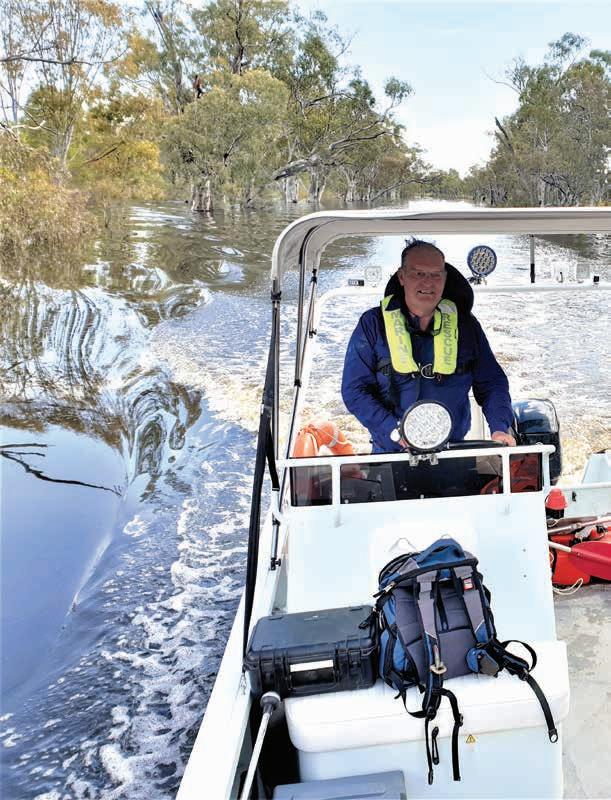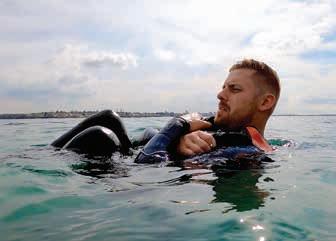
8 minute read
Our members in action
12 MARINE RESCUE NSW | Soundings Our members in action
Six sailors owe lives to chance sighting off Narooma
Near miss prompts warning from Marine Rescue NSW Commissioner
Six young sailors aboard a 14 foot Hobie Cat owe their lives to a chance sighting and the efforts of the emergency services after their vessel was blown out to sea in strong winds off Narooma in early August.
The Hobie Cat and its six crew were observed by Marine Rescue Narooma Radio Operator David White when they nearly hit the breakwall heading across the bar and out into the Tasman Sea.
Earlier, a member of the public had contacted the radio base, concerned that the vessel appeared to be heading out with no apparent safety equipment.
The sailing boat was being rapidly pushed out to sea by strong westerly winds. Although no request for assistance had been received, given the crew’s apparent skill level and the concern of the member of the public, it was decided to send Marine Rescue Narooma rescue vessel Narooma 30 to do a welfare check.
With the support of the local NSW Police Marine Area Command in Eden, Narooma 30 reached the vessel, now far out to sea near Montague Island, to check on their welfare.
The vessel was observed to not have the required EPIRB, radio, flares or any means of communications in an emergency. One female crew member transferred onto the Marine Rescue vessel, but the others declined stating they were going to sail back to Narooma.
Narooma 30 decided to shadow them back to port, but the strong head winds made it impossible for the young sailors to make progress. The remaining five crew eventually agreed to transfer onto Narooma 30 and for their Hobie Cat to be towed back to the ramp.
While there was no legal requirement to act and no formal request for assistance, the vigilance of Marine Rescue Narooma’s radio operator and a member of the public, the support of Marine Area Command at Eden, and the actions of the crew, prevented what could have been a significant tragedy.
Marine Rescue NSW Commissioner Stacey Tannos thanked the Marine Rescue Narooma crew for their efforts and put out a call for boaters to always carry the necessary safety equipment before heading out on the water.
“As the skipper of a vessel the safety of all on board is your responsibility,” said Commissioner Tannos.
“It is essential to have all necessary safety equipment on board and the skills to operate your vessel safely, an understanding of the weather conditions, and to have Logged On with Marine Rescue NSW so someone knows where you are going, when you’ll return and can start searching for you if you are overdue.”

A Marine Rescue Narooma member looks towards crew members from the Hobie Cat with their vessel under tow in the distance.
The solo sailor and his partially submerged vessel.

Meeting about unit cooperation turns into actual rescue
Cold water hidden danger to boaters and paddlers
In a strange but fortunate turn of events, a meeting about potential training cooperation between members of Marine Rescue Sussex Inlet and Marine Rescue Batemans Bay turned into a very real rescue operation.
Marine Rescue Sussex Inlet Deputy Unit Commander, Tony Pollard and Marine Rescue Sussex Inlet Training Officer, Brett Eurell, were hosting the Marine Rescue Batemans Bay Training Officer, David Roulston at the Marine Rescue Sussex Inlet base to discuss what might be possible, when a joint search and rescue response suddenly became inevitable.
At 9.00 am on a cold Monday morning, a member of the public called the Marine Rescue State Communications Centre to report a capsized sailing vessel 400 metres from the shore off Macleans Point in the St Georges Basin.
The message was relayed from Sydney to the newly rated Marine Rescue Sussex Inlet Radio Operator Barry Albrighton, who passed


the message onto the members of the meeting, fortuitously occurring in the adjacent room. Tony, Brett and David shifted into action deploying on Sussex Inlet 20 in a race to rescue the occupant of the upturned vessel from the chilly waters.
Arriving on scene within just 15 minutes, they found a yachtsman clinging to a 3.5 m sailing dory which had overturned in the wind and had taken on water. The yachtsman, who was desperate to save his beloved vessel, was persuaded to leave it and come aboard the rescue vessel having been in the water for almost 30 minutes. Besides the expected lethargy that had set in from his frantic struggle, there were initially no obvious signs of hypothermia, but to be on the safe side the crew decided to ask the Radio Operator to arrange an ambulance.
After helping the man remove his wet clothes and covering him in blankets, they set out for the closest jetty in the Sussex Inlet channel to meet the ambulance. By the time they arrived at the jetty – just five minutes later - the yachtsman’s core temperature had drastically dropped and he started to become disorientated, unable to remember his name and was losing motor coordination. He was transferred to the care of paramedics who treated him for hypothermia.
Marine Rescue Sussex Inlet Rescue Water Craft operator Billy Norris and trainee Jim Ross were deployed on Sussex Inlet 10 and Sussex Inlet 11 to help secure the drifting vessel while Sussex Inlet 20 stood by in deeper waters.
Unit Commander Karen Lowry, who attended the Marine Rescue base to oversee the rescue, said it had been an excellent example of team work and an important reminder that the symptoms of hypothermia are not always obvious and can take around 30 minutes to develop in a person who has been in cold water.
She congratulated the crews on the quick response and noted that Barry, who was working his first shift alone, did an outstanding job coordinating with the NSW Police Force Marine Area Command, Marine Rescue NSW Zone Duty Operations Manager and NSW Ambulance, as well as calling in Rescue Water Craft operators to assist.
Marine Rescue NSW Deputy Commissioner Operations Alex Barrell said that the incident was a timely reminder that in the colder months boaters without a wetsuit or proper clothing can quickly succumb to hypothermia if they become wet, especially if it is windy.
“Signs of hypothermia include shivering, exhaustion, drowsiness, slurred speech and disorientation,” Deputy Commissioner Barrell said.
“It is essential that anyone exhibiting these symptoms are treated quickly by moving the person to a warm, dry place or sheltering them from the elements, taking off any wet clothing and covering them with a blanket or dry clothes, and having them drink a warm beverage until professional medical treatment can be obtained.”
‘It is also essential that boaters and paddlers dress appropriately before heading out on the water.”
Tony Pollard / Brett Eurell
To minimise the effects of hypothermia, use the Heat Escape Lessening Posture (HELP), by drawing your knees together and hugging them close to your chest using your arms. Photo: Brad Whittaker.
Emergency vehicles line up at the Marine Rescue Wooli base after the incident. Photo: Richard Taffs.

Near miss a reminder to take care on coastal bars
Quick thinking helps save father and son after boat overturns
Afather and his teenage son are lucky to be alive after their five metre runabout overturned on the Wooli River bar in late August as they headed out on a fishing trip.
Just after dawn on a Saturday morning two runabouts were observed by Marine Rescue Wooli Radio Watch Officer Jackie Taffs attempting to cross the Wooli River bar in rough conditions.
The first runabout had to contend with five sets of breaking waves of up to 2.5 metres, becoming near vertical on a few occasions, before making it to deeper water. The second vessel was not so fortunate, overturning and spilling its two crew members into the sea just past the breakwater.
The team at Marine Rescue Wooli instantly swung into action, with Deputy Unit Commander Richard Taffs who was also on duty, running down to the nearby bar with a hand held radio to keep a close watch on the position of the two fishermen so as to guide rescuers, while a rescue crew was quickly assembled for rescue vessel Wooli 30.
Fortunately the crew of the overturned vessel were wearing lifejackets, and were soon swept into the surf zone and onto the nearby Wooli Beach, where members of Marine Rescue Wooli collected them, returning them to the base for a first aid assessment, dry clothes and a hot drink ahead of the arrival of an ambulance and a more thorough medical examination before they were interviewed by NSW Police.
The near miss is a timely reminder of the dangers of crossing bars, and the need for boaters to be properly prepared, as crossing a coastal bar presents boaters with a range of hazards within a confined space, including swift currents, limited room to manoeuvre, large breaking waves and other boaters.
Plan your bar crossing by checking the local bar cam or eyeballing the bar in person. If in doubt, stay inshore and do not attempt a crossing. Watch the timing between wave sets, and avoid heading out on an ebb tide. Take particular note of the tide and weather forecast – a bar might be fine heading out, but become dangerous on the your return to port.
Boaters are reminded that a lifejacket is compulsory when crossing a bar, and it’s a good idea to Log On with your local Marine Rescue base who can advise you over your marine radio if the bar is safe to cross, and provide pointers if you are unfamiliar with it.

